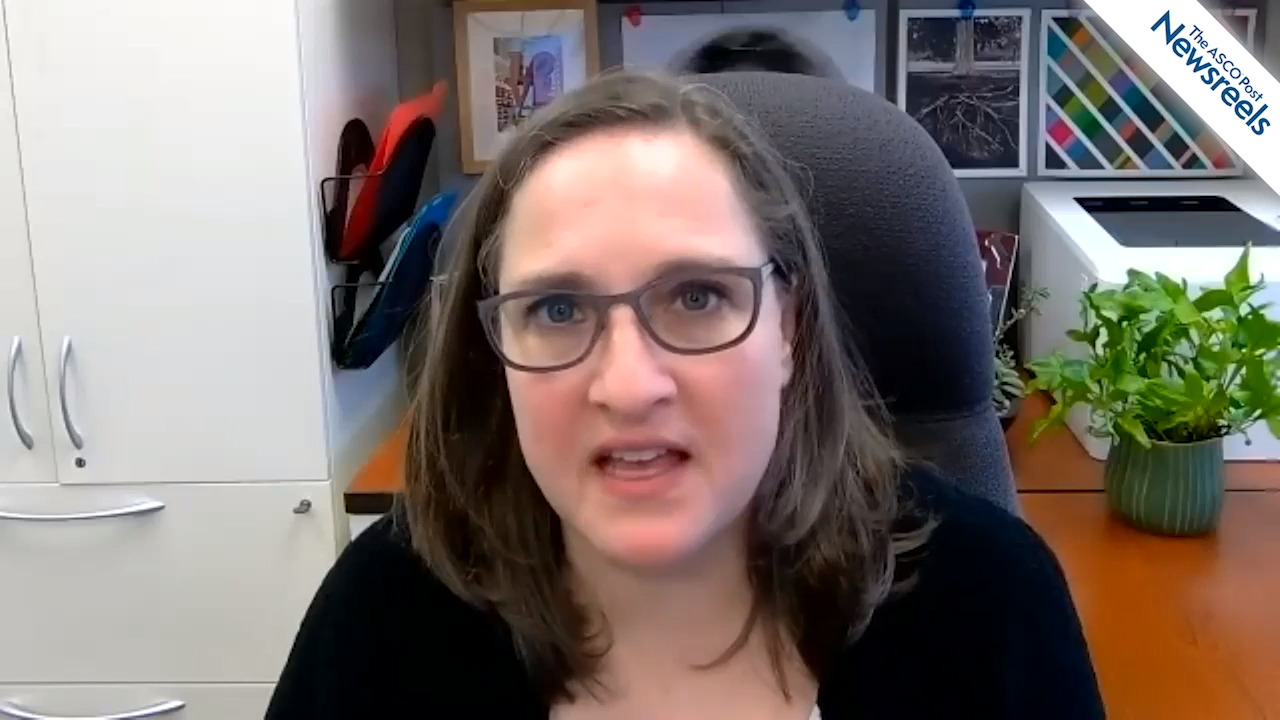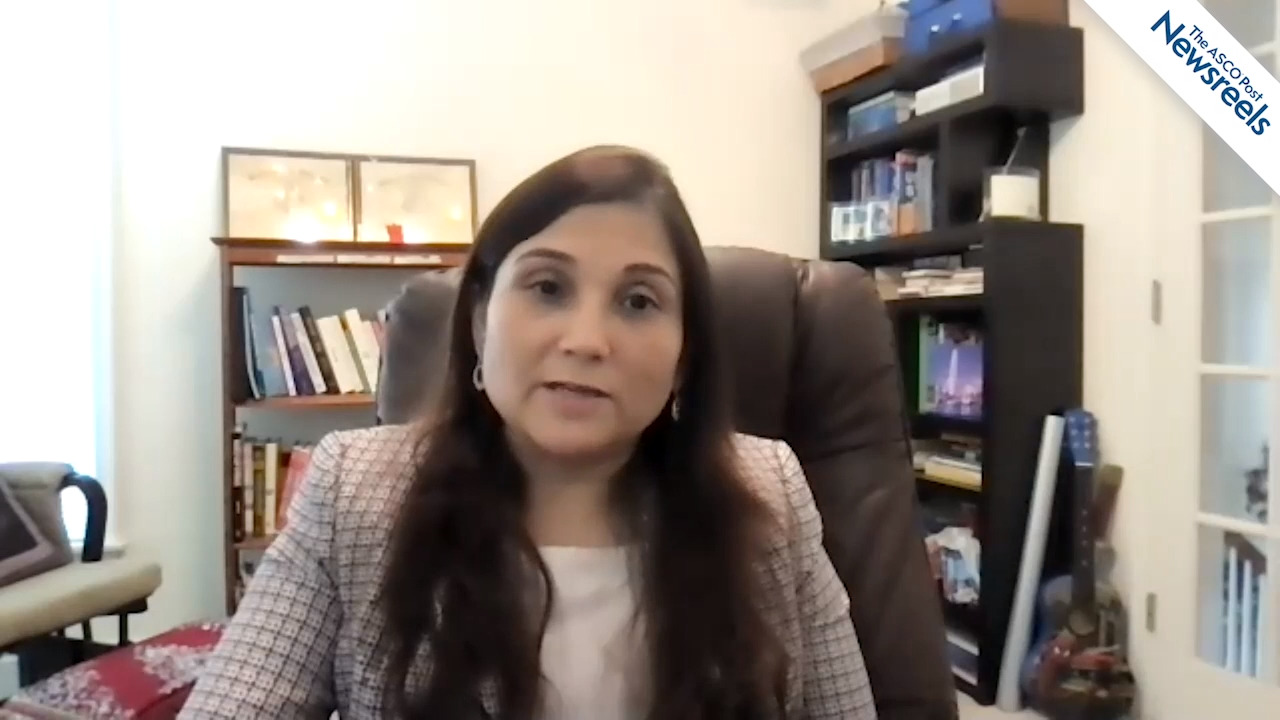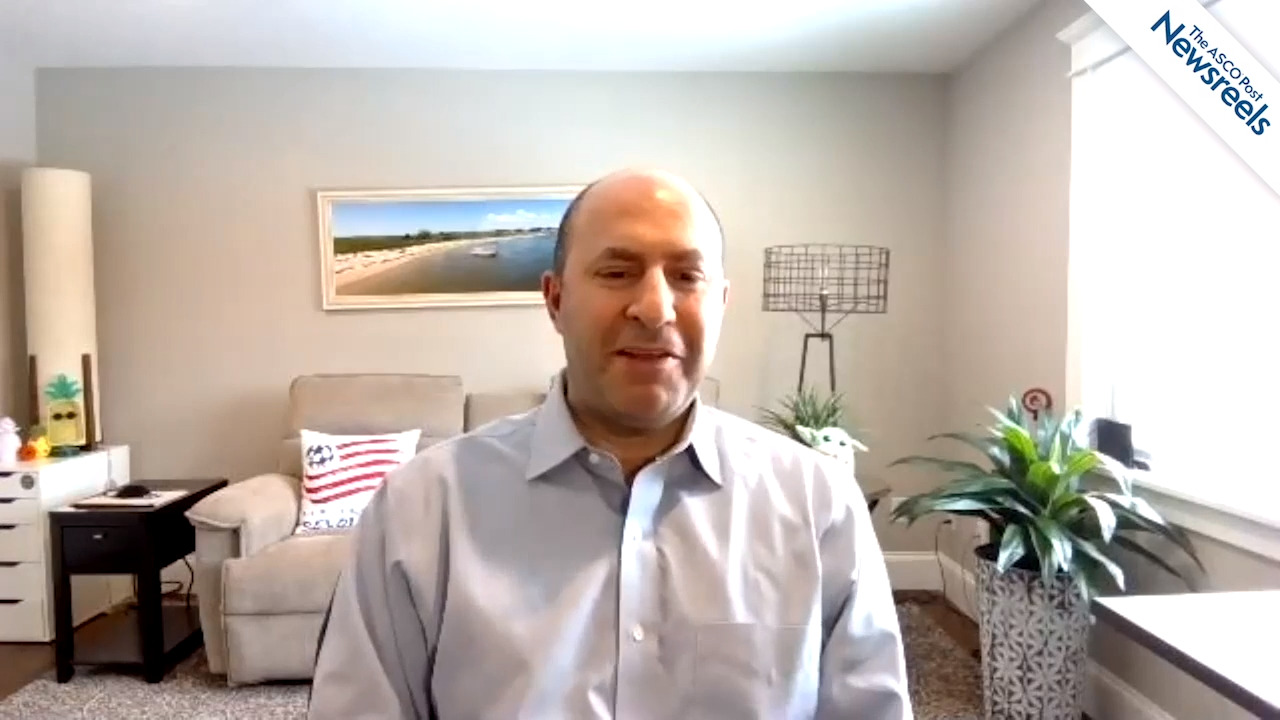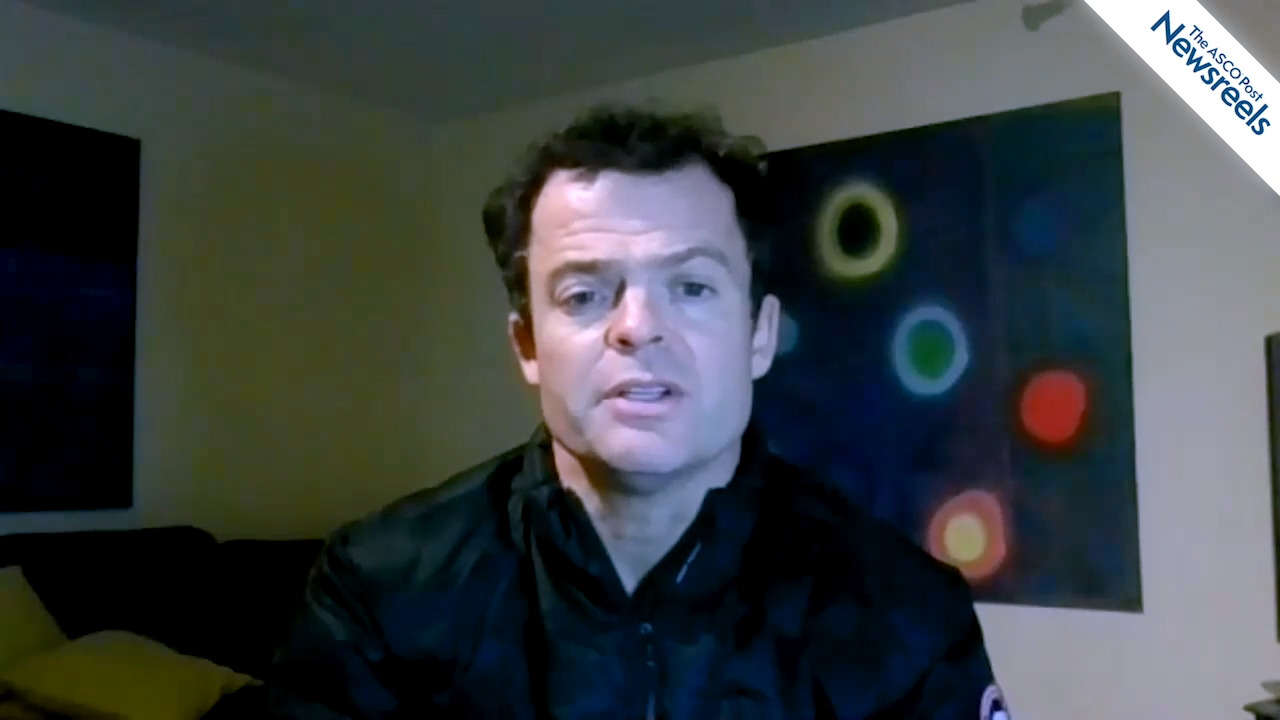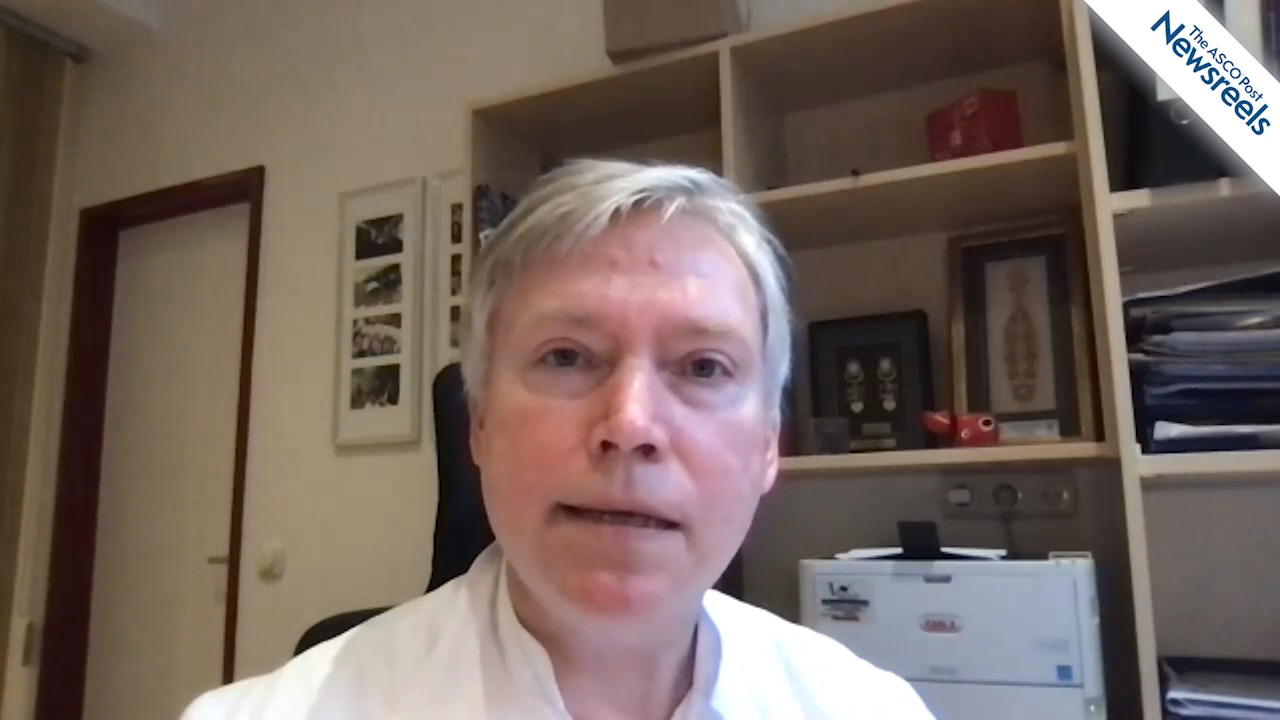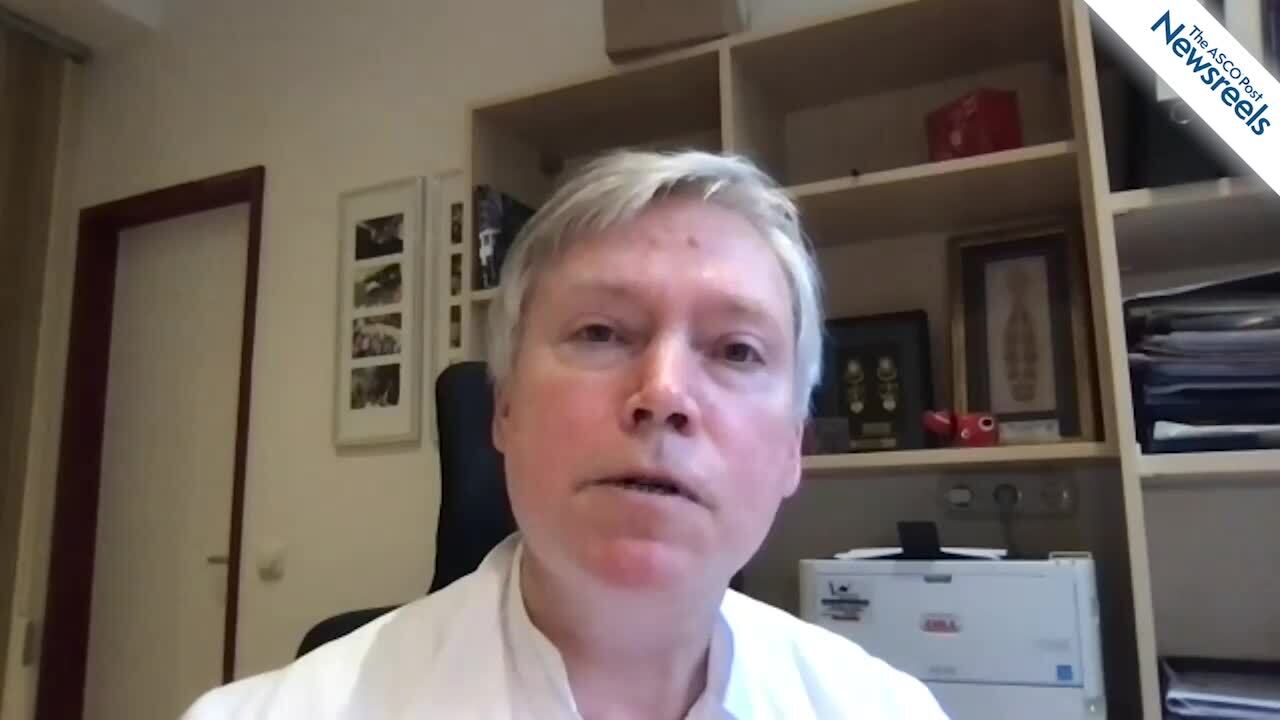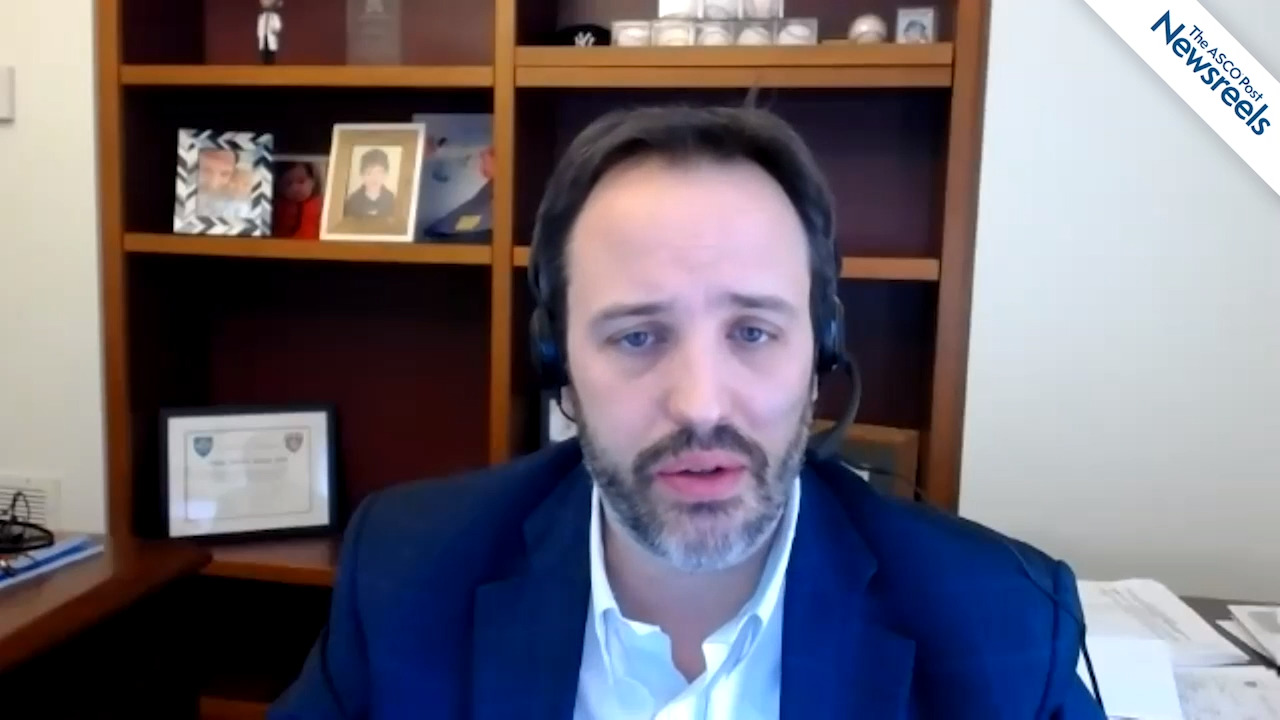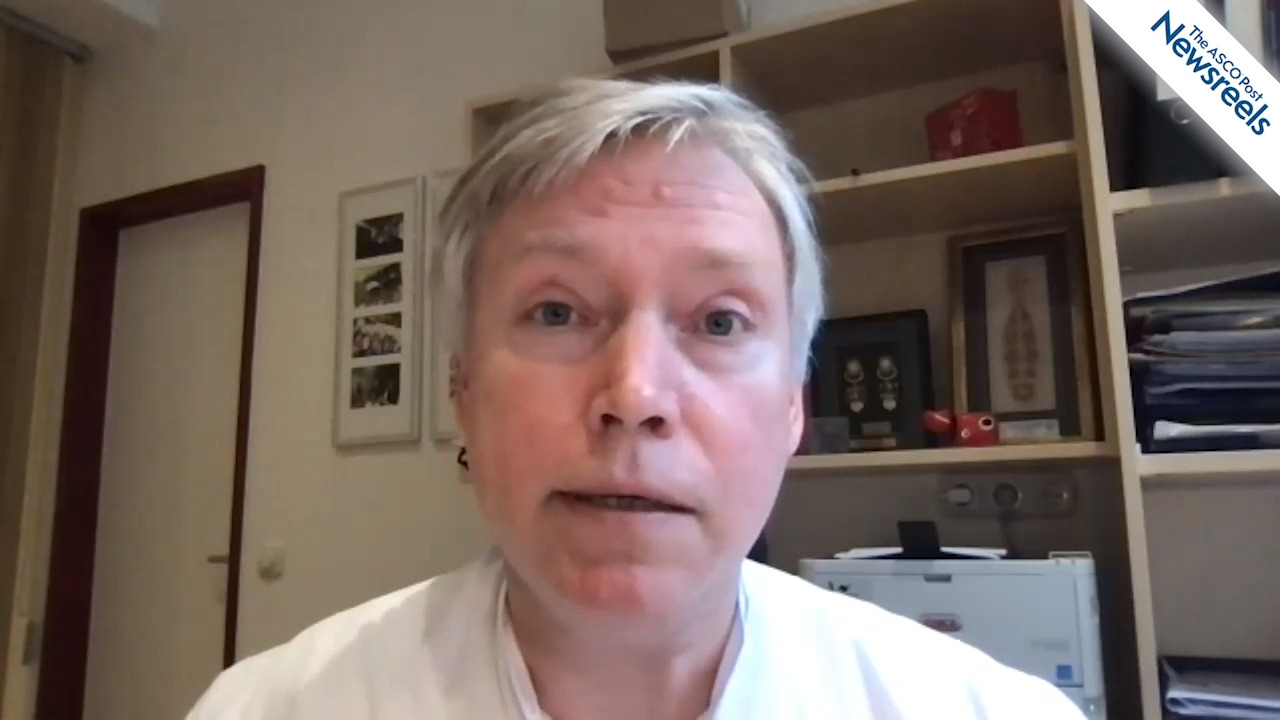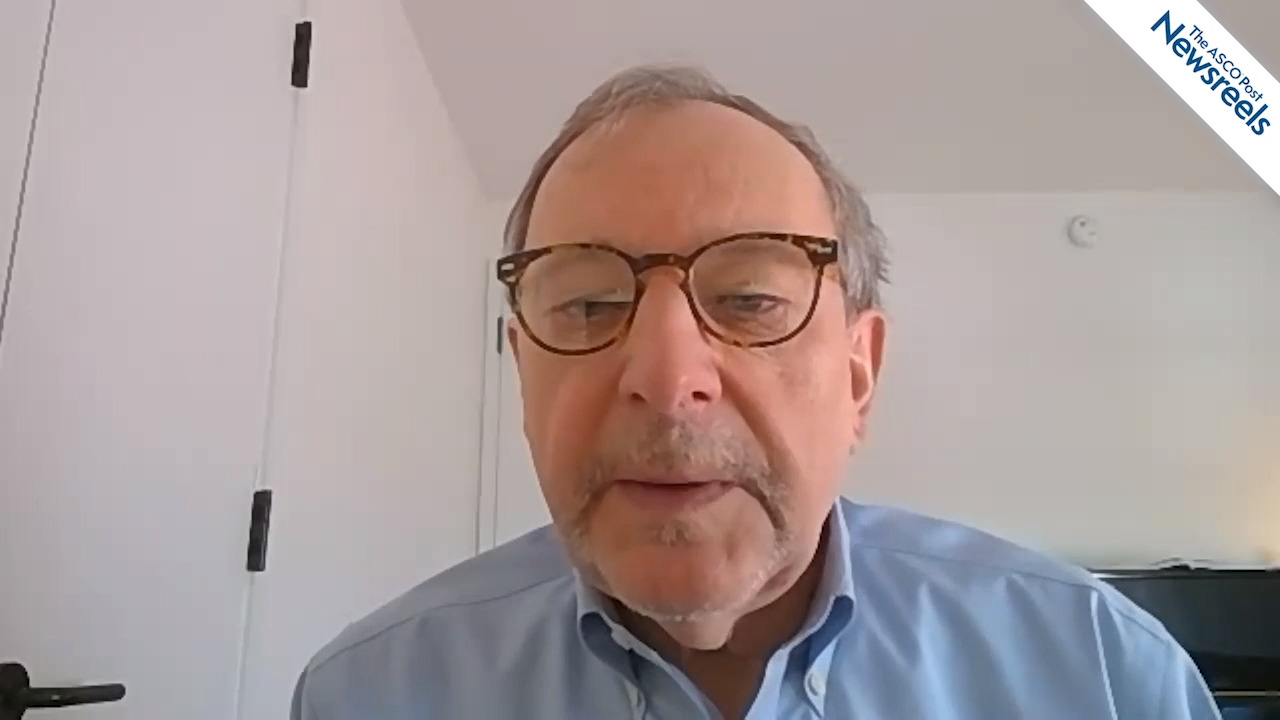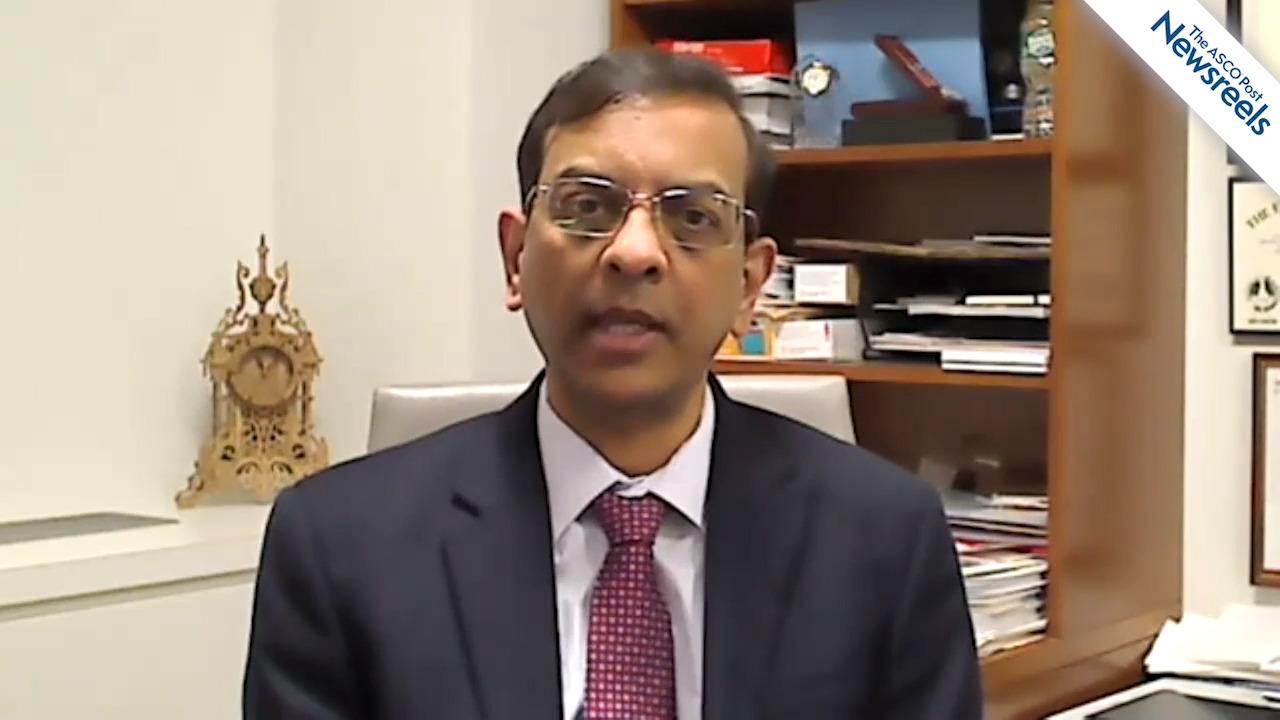Genome-Edited Donor-Derived Anti-CD19 CAR T-Cell Therapy Is Active in B-Cell Acute Lymphoblastic Leukemia
Pooled results of two phase I studies, reported in The Lancet by Reuben Benjamin, MBBS, of the Department of Haematological Medicine, King’s College Hospital, London, and colleagues, indicate that the genome-edited donor-derived allogeneic anti-CD19 chimeric antigen receptor (CAR) T-cell product...
B-Cell and T-Cell Non-Hodgkin Lymphomas
To complement The ASCO Post’s continued comprehensive coverage of the 2020 American Society of Hematology (ASH) Annual Meeting & Exposition, here are several abstracts selected from the meeting proceedings focusing on the assessment and treatment of patients with B-cell and T-cell non-Hodgkin...
Responses to Anti–PD-1/PD-L1 Immunotherapy in Patients With MSS Solid Tumors and High Tumor Mutational Burden
In a single-institution study reported in JAMA Oncology, Valero et al found that response rates to anti–PD-1 or anti–PD-L1 treatments in patients with microsatellite-stable (MSS) solid tumors were generally higher among those with high tumor mutational burden (TMB) defined as ≥ 10...
Elizabeth R. Plimack, MD, on RCC: Outcomes With Pembrolizumab Plus Axitinib
Elizabeth R. Plimack, MD, of Fox Chase Cancer Center, discusses phase III results from the KEYNOTE-426 study—specifically, an exploratory subgroup analysis of patients with advanced renal cell carcinoma who were randomly assigned to receive pembrolizumab plus axitinib and completed 2 years of treatment (Abstract 327).
Bevacizumab Beyond Disease Progression Plus Carboplatin-Based Doublet in Platinum-Sensitive Ovarian Cancer
In the phase III MITO16b/MANGO–OV2/ENGOT–ov17 trial, investigators found that treatment with a carboplatin-based doublet plus bevacizumab beyond disease progression significantly improved progression-free survival vs a carboplatin-based doublet alone in women with platinum-sensitive ovarian cancer...
Addition of Andecaliximab to mFOLFOX6 in First-Line Treatment of HER2-Negative Advanced Gastric Cancer
As reported in the Journal of Clinical Oncology by Manish A. Shah, MD, and colleagues, the phase III GAMMA-1 trial showed no improvement in overall survival with the addition of andecaliximab to modified oxaliplatin, leucovorin, and fluorouracil (mFOLFOX6) in the first-line treatment of...
NEOSTAR: Neoadjuvant Nivolumab or Nivolumab/Ipilimumab in Operable NSCLC
The randomized phase II NEOSTAR trial, which examined single-agent and combined neoadjuvant immune checkpoint inhibitor therapy in patients with stage I to III non–small cell lung cancer (NSCLC), found combination therapy produced a significant clinical benefit (as assessed by major pathologic...
DREAMM-2 Analysis: Number of Prior Treatments No Hindrance to Efficacy of Belantamab Mafodotin-blmf
A post hoc analysis of the phase II DREAMM-2 trial showed single-agent belantamab mafodotin-blmf to be efficacious and tolerable in patients with relapsed or refractory multiple myeloma treated with at least three prior therapies, investigators reported at the 2020 American Society of Hematology...
Belantamab Mafodotin-blmf Plus Pomalidomide and Dexamethasone Elicits Responses in Myeloma
Belantamab mafodotin-blmf combined with pomalidomide and dexamethasone led to a very good partial response (VGPR) or better in approximately three-quarters of patients with multiple myeloma that was double-class or triple-class refractory, according to Suzanne Trudel, MSc, MD, FRCPC, of Princess...
Expert Point of View: Ajay K. Nooka, MD, MPH, FACP
Ajay K. Nooka, MD, MPH, FACP, Associate Professor of Hematology and Medical Oncology at Emory University and Medical Director, Winship Research Informatics Shared Resource at Winship Cancer Institute, Atlanta, considered the presentations on bispecific T-cell–engaging antibodies in myeloma to be...
New Targets Explored for Bispecific T-Cell–Engaging Antibodies in Myeloma
B-cell maturation antigen (BCMA) is the most frequent target of immunotherapies in relapsed or refractory multiple myeloma, but bispecific T-cell–engaging antibodies with novel targets are also achieving promising results. Studies presented at the 2020 American Society of Hematology (ASH) Annual...
Expert Point of View: Sagar Lonial, MD, FACP
Sagar Lonial, MD, FACP, the Anne and Bernard Gray Family Chair in Cancer, Chair and Professor of Hematology and Medical Oncology, Emory University School of Medicine, Atlanta, commented on the APOLLO trial for The ASCO Post. “APOLLO is a highly awaited study, as the use of daratumumab plus...
Subcutaneous Daratumumab Meets Primary Endpoint in APOLLO Trial in Myeloma
The first phase III study to evaluate the subcutaneous form of daratumumab has met its primary endpoint, investigators of the APOLLO trial reported at the 2020 American Society of Hematology (ASH) Annual Meeting & Exposition.1 The triplet of daratumumab, pomalidomide, and low-dose dexamethasone ...
Expert Point of View: Marco Ruella, MD
Marco Ruella, MD, of Perelman School of Medicine and Scientific Director of the Lymphoma Program, University of Pennsylvania, commented on this study on CD58 aberrations: “This is a very important study because it describes a possible new mechanism for relapse after CAR-T19 immunotherapy in...
Overcoming CD58 Loss May Be Promising Path to Overcoming Resistance to CAR T-Cell Therapies
Engineering chimeric antigen receptor (CAR) T cells to overcome CD58 loss may be a way to boost responses in patients with diffuse large B-cell lymphoma (DLBCL) who do not respond to treatment with axicabtagene ciloleucel and other CAR T-cell therapies, according to a study presented at the 2020...
Expert Point of View: James Essell, MD
James Essell, MD, Medical Director of the Blood Cancer Center, The Jewish Hospital-Mercy Health Cincinnati Cancer and Cellular Therapy Center, and Chair of Cellular Therapy, observed that axicabtagene ciloleucel compares favorably with other chimeric antigen receptor (CAR) T-cell products being...
ZUMA-5: Axicabtagene Ciloleucel Elicits Response in Indolent Non-Hodgkin Lymphoma
In the phase II ZUMA-5 trial, the cellular immunotherapy axicabtagene ciloleucel led to responses in 92% of patients with indolent non-Hodgkin lymphoma (NHL), researchers reported at the 2020 American Society of Hematology (ASH) Annual Meeting & Exposition.1 Axicabtagene ciloleucel has improved ...
Chemotherapy Plus Blinatumomab for Philadelphia Chromosome–Negative B-Cell ALL
Results from a phase II study presented by Nicholas J. Short, MD, and colleagues at the 2020 American Society of Hematology (ASH) Annual Meeting & Exposition showed that first-line treatment with a regimen of chemotherapy combined with the monoclonal antibody blinatumomab resulted in increased...
ASH 2020 Meeting Highlights
The world of hematologic malignancies continues to move forward at a robust pace despite the challenges of the COVID era. Although some areas of clinical trials and basic research suffered short-term stoppages or delays due to the pandemic, the studies presented at the 2020 American Society of...
Addition of Adjuvant Pertuzumab to Chemotherapy Plus Trastuzumab in Early HER2-Positive Breast Cancer: 6-Year Follow-up of the APHINITY Trial
As reported in the Journal of Clinical Oncology by Martine Piccart, MD, PhD, and colleagues, the preplanned second interim analysis of overall survival in the phase III APHINITY trial showed no significant benefit of the addition of adjuvant pertuzumab to chemotherapy plus trastuzumab after a...
Effect of Organ Function–Based Eligibility Criteria on Clinical Trial Enrollment for Patients With DLBCL
In a study reported in the Journal of Clinical Oncology, Khurana et al found that up to 24% of patients with newly diagnosed diffuse large B-cell lymphoma (DLBCL) receiving standard immunochemotherapy are excluded from participation in clinical trials on the basis of organ function eligibility...
Monika Joshi, MD, on Urothelial Cancer of the Bladder: Durvalumab and Radiotherapy for Localized Disease
Monika Joshi, MD, of Penn State Hershey Cancer Institute, discusses phase II results from the DUART study, which explored the efficacy of concurrent durvalumab, a checkpoint inhibitor, and radiation therapy followed by adjuvant durvalumab in patients with localized urothelial cancer of the bladder (Abstract 398).
KEYNOTE-427: First-Line Pembrolizumab in Advanced Clear Cell Renal Cell Carcinoma
As reported in the Journal of Clinical Oncology by McDermott et al, findings in a cohort of the phase II KEYNOTE-427 study showed that pembrolizumab monotherapy produced durable responses as first-line treatment for advanced clear cell renal cell carcinoma. In a separate cohort of the study,...
KEYNOTE-598 Trial: Addition of Ipilimumab to Pembrolizumab in Previously Untreated Patients With Metastatic NSCLC and High PD-L1 Expression
As reported in the Journal of Clinical Oncology by Michael Boyer, MBBS, PhD, and colleagues, an interim analysis in the phase III KEYNOTE-598 trial showed no improvement in overall or progression-free survival with the addition of ipilimumab to pembrolizumab in previously untreated patients with...
Toni K. Choueiri, MD, on RCC: Treatment With Lenvatinib Plus Pembrolizumab or Everolimus vs Sunitinib
Toni K. Choueiri, MD, of Dana-Farber Cancer Institute, discusses phase III results of the CLEAR study, which showed that for first-line treatment of advanced renal cell carcinoma, lenvatinib plus pembrolizumab improved outcomes vs sunitinib. Lenvatinib plus everolimus also improved progression-free survival and overall survival rates vs sunitinib (Abstract 269).
Fecal Microbiota Transplants May Help Patients With Advanced Melanoma Respond to Immunotherapy
For patients with melanoma who do not respond to treatment with immunotherapy, adjusting the composition of microorganisms in the intestines through the use of fecal transplants may aid in overcoming resistance to therapy. These findings were published by Davar et al in Science. In the study, some...
Enfortumab Vedotin-ejfv Prolongs Survival in Patients With Metastatic Urothelial Carcinoma
Treatment with the antibody-drug conjugate enfortumab vedotin-ejfv has been found to significantly increase survival of patients with metastatic urothelial carcinoma, according to results from the phase III EV-301 clinical trial. These findings were presented by Thomas Powles, MD, PhD, and...
Thomas Powles, MD, PhD, on Urothelial Carcinoma: Enfortumab Vedotin-ejfv vs Chemotherapy
Thomas Powles, MD, PhD, of Cancer Research UK Barts Centre, discusses phase III results from the EV-301 trial, which showed that enfortumab vedotin is the first therapy to demonstrate a significant survival advantage over standard chemotherapy in patients with previously treated locally advanced or metastatic urothelial carcinoma (Abstract 393).
Achievement and Maintenance of MRD Negativity With Daratumumab-Containing Regimens in Patients With Relapsed or Refractory Multiple Myeloma
In an analysis of the phase III POLLUX and CASTOR trials reported in the Journal of Clinical Oncology, Avet-Loiseau et al found that the addition of daratumumab to standard therapy was associated with higher rates of—and more prolonged—measurable residual disease (MRD) negativity in patients with...
Martin Reck, MD, PhD, on SCLC: Maintenance Therapy for Patients With Extensive-Stage Disease
Martin Reck, MD, PhD, of LungenClinic, discusses results from the IMpower133 study of carboplatin plus etoposide with or without atezolizumab in patients with untreated extensive-stage small cell lung cancer (Abstract OA11.06).
Martin Reck, MD, PhD, on NSCLC: Pembrolizumab, Platinum Chemotherapy, and Radiotherapy in Advanced Disease
Martin Reck, MD, PhD, of the LungenClinic, discusses the results from KEYNOTE-799, which explored a new strategy to increase the intensity of treatment in patients with unresectable, locally advanced, stage III non–small cell lung cancer (Abstract OA02.03).
Nivolumab Plus Cabozantinib Shows Sustained Benefits as First-Line Treatment for Advanced RCC
New analyses from the phase III CheckMate 9ER trial are being presented at the 2021 Genitourinary Cancers Symposium. These new findings demonstrate clinically meaningful, sustained efficacy benefits as well as quality-of-life improvements with the combination of nivolumab and cabozantinib compared...
Nivolumab/Ipilimumab vs Chemotherapy as First-Line Treatment for Unresectable Malignant Pleural Mesothelioma: CheckMate 743 Trial
As reported in The Lancet by Paul Baas, MD, and colleagues, a prespecified interim analysis in the phase III CheckMate 743 trial has shown improved overall survival with first-line nivolumab/ipilimumab vs platinum-based chemotherapy in patients with unresectable malignant pleural mesothelioma. The...
Expert Point of View: William Gradishar, MD
William Gradishar, MD, the Betsy Bramsen Professor of Breast Oncology at Northwestern University Feinberg School of Medicine and Deputy Director for the Clinical Network of the Lurie Cancer Center, commented on the findings of the ASCENT biomarker analysis in the closing panel discussion. The...
Is Trop-2 Expression Associated With Benefit From Sacituzumab Govitecan-hziy?
The antibody-drug conjugate sacituzumab govitecan-hziy (sacituzumab govitecan) is beneficial in previously treated patients with metastatic triple-negative breast cancer, irrespective of Trop-2 expression, according to a biomarker analysis of the phase III ASCENT trial.1 Although greater efficacy...
Novel Insights Into Multiple Myeloma
“Knowledge has a beginning but no end.” —Geeta Iyengar To complement The ASCO Post’s continued comprehensive coverage of the 2020 American Society of Hematology (ASH) Annual Meeting & Exposition, here are three abstracts selected from the meeting proceedings focusing on novel therapies for...
Expert Point of View: James Essell, MD
James Essell, MD, Medical Director of the Blood Cancer Center, The Jewish Hospital-Mercy Health Cincinnati Cancer and Cellular Therapy Center, and Chair of Cellular Therapy, observed that axicabtagene ciloleucel compares favorably with other CAR T-cell products being evaluated for indolent...
ZUMA-5: Axicabtagene Ciloleucel Elicits Response in Indolent Non-Hodgkin Lymphoma
In the phase II ZUMA-5 trial, the cellular immunotherapy axicabtagene ciloleucel led to responses in 92% of patients with indolent non-Hodgkin lymphoma (NHL), researchers reported at the 2020 American Society of Hematology (ASH) Annual Meeting & Exposition.1 Axicabtagene ciloleucel has improved ...
Expert Point of View: John C. Krauss, MD
The invited discussant of the GARNET study, John C. Krauss, MD, Medical Oncology Director of the Multidisciplinary Colorectal Cancer Clinic, Rogel Cancer Center of the University of Michigan, Ann Arbor, observed that “impressive” response rates to dostarlimab were demonstrated in a “relatively...
Anti–PD-1 Antibody Dostarlimab Active in Mismatch Repair–Deficient Gastrointestinal Tumors
Dostarlimab, a monoclonal antibody targeting PD-1, showed antitumor activity in patients with mismatch repair–deficient (dMMR) gastrointestinal tumors in the phase I GARNET study, reported at the 2021 Gastrointestinal Cancers Symposium by Thierry André, MD, of Sorbonne University and Saint-Antoine...
Justin F. Gainor, MD, on NSCLC: Study Results on Nivolumab vs Ipilimumab, Bemcentinib Plus Pembrolizumab
Justin F. Gainor, MD, of Massachusetts General Hospital, discusses two key phase II studies on non–small cell lung cancer: nivolumab vs nivolumab plus ipilimumab in EGFR-mutant disease and the oral selective AXL inhibitor bemcentinib with pembrolizumab in advanced disease (Abstracts OA01.06 and OA01.07).
Martin Reck, MD, PhD, on NSCLC: Pembrolizumab Plus Ipilimumab in First-Line Treatment
Martin Reck, MD, PhD, of the LungenClinic, discusses findings of the KEYNOTE-598 study, which showed that pembrolizumab plus ipilimumab was more toxic and offered no more benefit in terms of efficacy than pembrolizumab plus placebo in first-line therapy for patients with metastatic high PD-L1–expressing non–small cell lung cancer (Abstract PS01.09).
CheckMate 274: Adjuvant Nivolumab May Improve Disease-Free Survival in Patients With Muscle-Invasive Urothelial Carcinoma
Treatment with the immunotherapy nivolumab with or without cisplatin-based chemotherapy following radical surgery significantly improved disease-free survival in patients with muscle-invasive urothelial carcinoma, irrespective of their PD-L1 status, according to a study that will be presented by...
Five-Year Outcomes From the CheckMate 017 and 057 Trials of Nivolumab vs Docetaxel in Previously Treated Patients With NSCLC
In an analysis of the phase III CheckMate 017 and 057 trials in previously treated patients with advanced squamous (017) and nonsquamous (057) non–small cell lung cancer (NSCLC), reported in the Journal of Clinical Oncology, Hossein Borghaei, DO, MS, and colleagues found pooled 5-year overall...
Lisocabtagene Maraleucel Approved by FDA for Patients With Relapsed or Refractory Large B-Cell Lymphoma
On February 5, 2021, the U.S. Food and Drug Administration (FDA) approved lisocabtagene maraleucel (Breyanzi) for the treatment of adult patients with relapsed or refractory large B-cell lymphoma after two or more lines of systemic therapy, including diffuse large B-cell lymphoma (DLBCL) not...
Fred R. Hirsch, MD, PhD, on Lung Cancer: Survival and Tumor Mutation Burden
Fred R. Hirsch, MD, PhD, of Mount Sinai Medical Center, discusses Lung-MAP studies in which a higher tumor mutation burden determined by next-generation sequencing was linked to overall and progression-free survival across two immunotherapy trials, and was independent of PD-L1 status (Abstract OA01.04).
HIC Assays May Aid in Predicting Response to Immunotherapy Among Patients With NSCLC
Using a host immune classifier (HIC) test for patients with non–small cell lung cancer (NSCLC) may provide better predictors of treatment response and improve outcomes, according to research presented by Akerley et al at the International Association for the Study of Lung Cancer (IASLC) 2020 World...
Patients With Lymphoma Receiving B-Cell–Depleting Therapies May Be at Greater Risk for Persistent COVID-19 Infection
B-cell–depleting immunotherapy may cause B-cell aplasia and impair the body’s immune response. A retrospective, multicentric French study of patients with lymphoma and persistent COVID-19 infection has found that those treated with B-cell–depleting therapies within the previous 12 months had nearly ...
Prasad S. Adusumilli, MD, on Cell Therapy for Solid Tumors
Prasad S. Adusumilli, MD, of Memorial Sloan Kettering Cancer Center, discusses ongoing CAR T-cell therapy clinical trials for solid tumors, the key determinants of success for developing this treatment, and some study results to date (Abstract PL03.05).
Margetuximab-cmkb vs Trastuzumab in Heavily Pretreated Patients With HER2-Positive Breast Cancer: SOPHIA Trial
As reported in JAMA Oncology by Hope S. Rugo, MD, and colleagues, the phase III SOPHIA trial has shown significantly prolonged progression-free survival with margetuximab-cmkb plus chemotherapy vs trastuzumab plus chemotherapy in patients with HER2-positive breast cancer who experienced disease...
